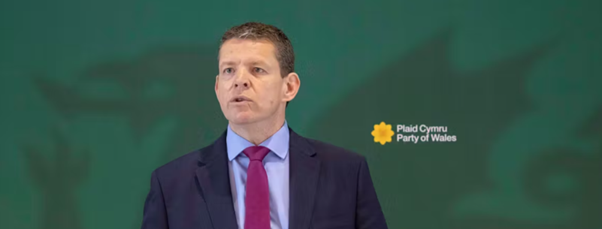In their 2024 general election manifesto, Plaid Cymru says they will “support the devolution of broadcasting powers to Wales”. This would include the power to regulate, oversee and secure accountability for broadcasting and communications within Wales.
They also call for “the establishment of an independent Broadcasting Authority for Wales” and say they “see no reason why governance of S4C should be in the hands of Westminster, rather than our democratically elected representatives in Wales”.
The manifesto is responding to mounting pressure among some Welsh political parties for control over broadcasting to be devolved to Wales.
In December 2021, the Welsh Labour government and Plaid Cymru announced a new cooperation agreement that outlined several policy commitments over the next three years. Among them was the creation of a new shadow broadcasting and communications authority, which would draw up plans to devolve broadcasting and communications powers to the Senedd (the Welsh parliament).
This signified a major shift on the part of the government that had, until that point, argued that broadcasting and media policy matters should be a matter reserved for the UK government.
Although Plaid Cymru withdrew from the cooperation agreement in May 2024 following a vote of no confidence in the first minister, Vaughan Gething, plans to establish an authority to oversee broadcasting and communication in Wales are still going ahead.
In addition to calls in the report of an expert panel established in the wake of the cooperation agreement, the independent thinktank, the Institute of Welsh Affairs undertook research and published reports in 2023 that supported the move of broadcasting and communication control from London to Cardiff.
Then in March this year, the Senedd Culture Committee published its report on public service broadcasting in Wales. Again, it called for the devolution of powers to Wales.
Writing in a recent special issue of Political Quarterly, which focused on the future of public service media, my colleague, Siân Nicholas and I discussed public service broadcasting in Wales, past, present and future, and raised the issue of devolving broadcasting powers.
We concluded that, as things stand, it would be a difficult thing to do. That’s because it would require legislation from the UK government to allow any kind of transfer of powers from the Department of Digital, Culture, Media and Sport to the Senedd.
But things have changed. We are now facing the prospect of a Labour government in Westminster working with a Labour government in Wales. Will this changed political dynamic result in a change of policy?
The crunch question is what kind of powers could and should be devolved? Which broadcasters? S4C, the Welsh-language broadcaster, is an obvious candidate, but what about the BBC’s Welsh services on radio, television and online in English and in Welsh?
That might mean a more federal structure to the BBC’s operation. And what about ITV Cymru Wales? Devolving regulatory powers from Ofcom might also be a way forward in making broadcasters more accountable to Welsh audiences. There are, at this stage, more questions than answers – but that is not to say that these are unanswerable.
If broadcasting powers – in some shape or form – are devolved to Wales, what would that mean for the rest of the UK? It’s interesting to note that the Scottish National Party have also highlighted broadcasting in their general election manifesto, arguing that:
Broadcasting is a crucial platform to showcase Scottish life and culture, but with power over broadcasting reserved to Westminster we are restricted in our ability to ensure it better reflects the needs and priorities of Scottish audiences.
This is an important aspect to consider – what broadcasting policy might look like in an increasingly devolved UK. The current UK government is opposed to devolving powers over broadcasting. And while the Labour manifesto talks of strengthening the links between Westminster and Cardiff Bay should it form the next government, broadcasting is not mentioned specifically.
But it is a question that I, and colleagues from the universities of Ulster, Glasgow, and Goldsmiths are hoping to answer in a new research project. If funded (and we won’t know until later this year) we will bring academics, policymakers, broadcasters and members of the public together to discuss, debate and maybe shape policy.![]()
Mae'r erthygl hon wedi ei hailgyhoeddi o The Conversation dan drwydded Creative Commons. Darllenwch yr erthygl lawn a wreiddiol yma.




